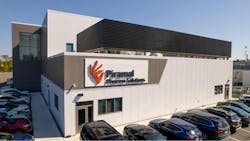Piramal Pharma to expand two US facilities, target hot ADC and fill-finish markets
India-headquartered contract development and manufacturing organization Piramal Pharma is spending $90 million to expand its facilities in Lexington, Kentucky, and Riverview, Michigan, positioning the company to meet the growing demand for sterile injectables and antibody-drug conjugates (ADCs).
Last month, the CDMO broke ground on the expansion of its dedicated fill-finish facility in Lexington, which specializes in sterile compounding, liquid filling, and lyophilization for sterile injectable drug products.
Piramal’s Lexington expansion, which is expected to be completed by late 2027, will add commercial-scale sterile injectable manufacturing capabilities with 24,000 additional square feet of space, a new laboratory, as well as a new filling line, two commercial-size lyophilizers, a specialized capping machine, and an external vial washer.
According to Piramal, the expansion will more than double the Lexington facility’s manufacturing capacity from 104 product batches annually — at peak utilization — to more than 240 batches per year.
Peter DeYoung, CEO of Piramal Global Pharma, told Pharma Manufacturing that the timing of the CDMO’s U.S. investment at its Lexington and Riverview sites was driven in part by strong customer demand for bioconjugates, which “represent a large opportunity with many projects in the pipelines of global innovators.”
As the first CDMO to deliver an ADC program to market, according to DeYoung, Piramal is well positioned to support this expanding market.
At Riverview, one of Piramal’s North American active pharmaceutical ingredient (API) sites, the expansion will add a commercial-scale suite specifically designed for the development and manufacturing of payload-linkers, which is expected to be operational by the end of 2025. The Riverview facility will provide the payload-linkers which are essential to the overall safety, stability, and efficacy of ADC therapies, according to the company.
In addition to the hot ADC market, Piramal’s research indicates the global sterile injectables market is projected to reach more than $20 billion by 2028.
DeYoung said the expected strong growth of sterile injectables is “a big part of our rationale” for the addition of commercial-scale sterile fill-finish capabilities, which “has been on our radar for a few years, because previously we were only able to deliver clinical scale fill-finish or small volume commercial programs.” He added that the expansion will “provide us with commercial scale manufacturing just at the time when the current clinical projects graduate to commercial.”
At the same time, DeYoung also noted that there are likely to be increased opportunities for injectables — and other drug products — based on the FDA’s recent announcement of the new Commissioner’s National Priority Voucher (CNPV) program, which expedites the agency’s review process.
“CDMO partners that can deliver speed through integrated services are well positioned to support innovator companies in voucher programs,” according to DeYoung.
Tariffs not a factor
Asked if the potential threat of tariffs was a factor in Piramal’s decision to expand in the U.S., DeYoung said the geopolitical situation and trend toward onshoring “happens to be synergistic” with its investment. The $90 million-worth of expansions at the Lexington and Riverview sites are incremental to the CDMO’s prior investments of $570 million in the U.S.
“While geopolitical circumstances are always a concern for a global CDMO, they were not the driving force behind this expansion,” according to DeYoung. “It was driven by a need to support increased demand among our customers across clinical and commercial supply.”
Both the Lexington and Riverview sites are critical to Piramal’s ADCelerate integrated offering, which provides the components essential to the overall safety, stability, and efficacy of ADC therapies.
Although each site has independent benefits and stand-alone applications, DeYoung said “an additional benefit is their support of our globally integrated antibody-drug conjugation program, ADCelerate,” which “combines development and manufacturing of the mAB, payload-linker, conjugation, and fill-finish into a single program that shortens timelines.”
Biopharma companies are looking for CDMOs who can handle high-potency APIs, conduct bioconjugations, and support the integrated supply of critical components.
Piramal is currently seeing a “high level of customer demand for the concept of integrated ADC work, as well as for stand-alone fill-finish programs,” DeYoung added. “The investment we are making in Lexington was designed specifically to support market demand in both areas.”
About the Author
Greg Slabodkin
Editor in Chief
As Editor in Chief, Greg oversees all aspects of planning, managing and producing the content for Pharma Manufacturing’s print magazines, website, digital products, and in-person events, as well as the daily operations of its editorial team.
For more than 20 years, Greg has covered the healthcare, life sciences, and medical device industries for several trade publications. He is the recipient of a Post-Newsweek Business Information Editorial Excellence Award for his news reporting and a Gold Award for Best Case Study from the American Society of Healthcare Publication Editors. In addition, Greg is a Healthcare Fellow from the Society for Advancing Business Editing and Writing.
When not covering the pharma manufacturing industry, he is an avid Buffalo Bills football fan, likes to kayak and plays guitar.
